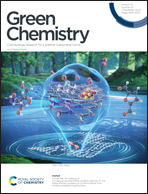Molten plastic induced noncovalent interactions for tunable cellulose fast pyrolysis†
Abstract
Fast pyrolysis of lignocellulosic biomass is a promising approach for producing biofuels and renewable chemicals, but the resultant bio-oil quality and diverse product distributions limit its widespread adaptation. Concurrently, the accumulation of waste plastics in the environment, particularly polyolefin thermoplastics, is becoming a growing threat. Co-pyrolysis of biomass with hydrogen-rich thermoplastics has shown promise for producing high-quality bio-oils, presenting an attractive solution to waste management. However, a molecular-level understanding of the synergy of the two components in the molten phase during co-pyrolysis is still lacking. In this work, we report the discovery of catalytic and inhibitory effects on cellulose fast pyrolysis caused by noncovalent interactions (NCIs) induced by molten plastics. Our microreactor experiments demonstrated that selectivity toward cellulose-derived anhydrosugars, small oxygenates, or furans increased due to the presence of polyketone, polyethylene glycol, or polystyrene, respectively, which are three thermoplastics with distinct functional groups. Density functional theory calculations reveal that key cellulose pyrolysis pathways leading to major products are catalyzed or inhibited due to perturbations of transition state geometries and partial charges caused by the NCIs induced by plastic functional groups. This discovery offers insights and opportunities for tuning cellulose fast pyrolysis via NCIs using a new family of unconventional molten plastic catalysts or inhibitors.



 Please wait while we load your content...
Please wait while we load your content...